- Home
- Patrick Carman
Floors Page 6
Floors Read online
Page 6
“Sorry, Dad,” said Leo. “It won’t happen again.”
“And I got the ducks back to the roof for you. You know how Ms. Sparks gets if we leave them on the grounds too long.”
“Thanks, Dad.”
Even at his young age, Leo knew his dad was a little bit broken, a little bit sad. There were reasons for this that Leo didn’t like to think about, but one thing he knew for sure: He wouldn’t lie to his dad, because he loved him too much. There would be no elaborate yarn about where he’d been that his father would probably believe.
“Good luck avoiding the wrath of Ms. Sparks, though,” Mr. Fillmore said. “I can’t save you from that.”
Leo held his breath, waiting for his dad to see, wondering if he’d done the right thing.
“What’s this?” the big man said, seeing the ring on his pillow and picking it up. The moment he did, Leo knew he’d made the right choice.
“I found it for you,” said Leo, which was true.
Leo’s dad didn’t say anything. He stared at the ring as he lolled over and lay down on the sinking cot, moving it in the light.
“I don’t know how you did it, but thank you.”
They looked at each other then, smiling in a bittersweet sort of way. The ring had been missing a long time, but it was back now.
It had belonged to Leo’s mother.
Leo got up before light the next morning and went straight to the roof. He was too nervous to look inside the blue box with his dad snoring so nearby, but he knew by midmorning the basement would be empty and he could safely investigate. Leo brought the ducks down and walked them through the lobby, all in a perfect line, out the door and onto the vast grounds. It was a short walk, partly because he knew Ms. Sparks would soon arrive and he wanted to avoid seeing her, but also because Betty was in a foul mood.
“You miss Merganzer, don’t you?” Leo asked, but she wouldn’t look at him. Leo took the ducks safely back to the roof and returned to the basement, intent on starting his father’s coffee brewing.
“How about we go to the big breakfast this morning?” Mr. Fillmore said. “I have a feeling we’re going to need it.”
Leo began to protest, because it would mean seeing Ms. Sparks. But then he reasoned that a) he could not avoid her forever, b) breakfast at the Whippet was hard to resist, and c) it was a good sign that his dad wanted to eat breakfast with everyone. He’d been keeping to himself more and more, staying in the maintenance tunnels, avoiding contact with just about everyone.
Breakfast at the Whippet was brought over from the restaurant and served family style in the Puzzle Room, which was just off the lobby, across from the duck elevator. It was the one time when all the guests and staff members were invited to dine together. Often Leo was so busy during the day that he neglected lunch altogether and scarfed down a late dinner, so the big breakfast was a must if he could get it.
“Leo Fillmore,” said Ms. Sparks as he stepped foot into the Puzzle Room. “Sit here, next to me.”
Leo looked at Remi, who was ashen with concern for his friend, but there was nothing either one of them could do.
“Pass the hash browns,” said LillyAnn Pompadore, and Leo sat down.
Ms. Sparks was silent as Leo loaded his plate with eggs, bacon, and blueberries. She had half a grapefruit and two vitamins, which struck Leo as one of the saddest things he’d ever seen, given the choices she had.
“You know, with Mr. Whippet gone, I’m in charge,” she said, only loud enough for Leo to hear as the guests and the staff talked and laughed.
“I do know that, yes,” said Leo, trying to be as contrite as he could, for he knew this would please Ms. Sparks.
“I could hire a new maintenance man. How would that be?”
Leo looked at Ms. Sparks, frightened of what it would mean if they were tossed out on the street. He would never forgive himself if he got his father fired from the Whippet.
“Out with the old, in with the new. It has a certain ring to it, don’t you think?”
Leo knew better than to grovel or make promises. Ms. Sparks would not respond to such tactics. He took a bite of bacon, chewing quietly as her voice grew louder so everyone could hear.
“Mr. Bump is having trouble with the robot again,” she declared. “I want you up there the moment you finish that disgusting plate of food.”
“Yes, ma’am,” said Leo.
“And bring him some breakfast.”
Leo nodded.
Remi, who was in love with robots, piped in.
“You got robots up there?” he ventured, glugging down some milk as he waited for an answer.
“Yes,” said Ms. Sparks, staring at Pilar as she continued. “We got robots up there. Not that you’ll be seeing them any time soon.”
The accusing look seemed to indicate one of two things: Either Ms. Sparks thought Pilar had done a poor job teaching her child English, or she was sending a veiled threat to the maid: Don’t let your little urchin out of the lobby while I’m gone, or else.
Leo looked down the table and saw that everyone but Mr. Bump and Mr. Yancey had shown up. His dad was there, wearing the ring on a chain around his neck, which pleased Leo immensely. Ms. Pompadore was holding Hiney, feeding him bits of sausage, and yammering with Mrs. Yancey, the oil tycoon’s wife. The bratty little girl, Jane Yancey, was downing powdered white donuts with frightening efficiency. And Mr. Phipps stood with Captain Rickenbacker, drinking coffee and staring at the puzzle.
The puzzle was unusual for its size: There were eight hundred thousand pieces, which sat in pyramid-shaped piles on the longest table in the hotel (the length of twelve pool tables, to be exact).
“It’s coming along nicely,” said Captain Rickenbacker, gazing over the long table.
Mr. Phipps didn’t quite agree as he stared at the piles of pieces and the slight progress that had taken place in the years he’d been at the hotel, which were many.
“I would have hoped for better by now,” he said. “But the edge does look nice.”
He’d been the one to complete the edge of the puzzle, with Merganzer’s help, about a year before, after which Merganzer had whispered a secret to the old gardener.
“There are two hundred and twenty-three ducks pictured in the puzzle. And a pond. And I’m in there, too.” He had slapped Mr. Phipps on the back, nearly knocking the black freckles off his old, dark face, and added, “That should get you moving in the right direction!”
Mr. Phipps loved Merganzer, but he had no illusions about the puzzle. Clue or no clue, the puzzle would never be finished. It was just too big, too hard.
“Ducks, you say?” said Captain Rickenbacker, for Mr. Phipps had let slip the secret.
“Ducks.”
“Does this look like a duck?” asked the Captain, holding up a single yellow piece.
Mr. Phipps said that he thought it did, then walked to the other end of the table, leaving Captain Rickenbacker to hunt for pieces on his own.
“Why they waste their time on that ridiculous thing, I have no idea,” said Ms. Sparks, looking at the two men in disbelief.
“It’s a Zen thing,” said Clarence Fillmore. “Like meditation, or a rock garden.”
“What on earth are you babbling about?” said Ms. Sparks, who had no patience for mystical talk of any kind. She leaned over the table and turned her head to stare at Leo’s father, her tall beehive hairdo precariously close to touching a pile of pancakes.
“I don’t think finishing the puzzle is the idea,” said Mr. Fillmore.
Ms. Sparks was clearly unimpressed. “I have a mind to take Pilar’s vacuum to the whole mess and use the table for firewood.”
The attention was off of Leo, so he bolted from his chair, gathering a plate of baked goods for Mr. Bump as he gave Remi a look that said Keep your radio on, I’ll be calling you.
All Remi could think about was standing at the maddeningly dull door all morning, thinking about robots and cupcakes.
Afternoon couldn’t come soon en
ough.
“Are you alone?”
The voice came from behind the door to Theodore Bump’s room on the fourth floor.
“I am,” said Leo.
“Hand me my breakfast,” Mr. Bump said, his arm sliding out from the cracked-open door. Leo put the plate in his hand, the door swung open a bit more, and then the plate and the arm were gone. A moment later, the door flew open and Theodore Bump grabbed Leo by the arm, hauling him inside and slamming the door shut behind them.
“Can’t be too careful, wouldn’t you agree?” he asked Leo.
“I agree,” said Leo. He had come to learn that more often than not in the Whippet Hotel, short and agreeable answers were safest.
The room was fabulous; there were no two ways about it. If it weren’t for its eccentric guest, Theodore Bump, Leo would have liked to spend more time there. He was a kid after all, and all kids love robots.
Theodore Bump went to his desk and sat down, typing something out on a computer as he munched on a muffin. A familiar banging sound was coming from a room in the back, but Leo ignored it for the moment.
“I’m right in the middle of this, you understand? You’ll have to deal with the problem yourself.”
“Okay,” said Leo.
He couldn’t know if the rumors were true — no one knew. According to his father (and Pilar, who cleaned the room now and then), Mr. Bump was a writer. That part wasn’t so unusual. It was what he wrote, and how much, that made the rumors swirl. It was said that Theodore Bump wrote three novels a month under a total of nine assumed names. Pilar went so far as to say they weren’t just any novels under any old names, but famous novels and famous names. To hear it from her, Mr. Bump had written about half of the most popular books around.
Leo watched Mr. Bump type at lightning speed for a moment more, then the man turned in his threadbare blue robe and stared at the boy, his gray hair matted on one side as if he’d gotten out of bed and gone straight to the keyboard.
“I don’t like to be watched while I work. Do you mind?” he asked.
“Of course not,” said Leo. When Theodore Bump turned back to the screen, Leo leaned in close behind him and tried to see what the man was writing. He thought he saw a wildly famous writer’s name, but he couldn’t be sure.
He left Theodore Bump and followed the banging sound at the other end of the room. The place was completely overrun with robots. Some of the robots were small and sat in clusters on tables and shelves. Others were two or three feet tall and stood on the floor with nothing whatsoever to do. Mr. Bump had turned them all off because they made too much noise.
There were the bigger robots, some of them larger than Leo, and most of them with minds of their own. One made the bed, another vacuumed, another dusted all the other robots, and one dispensed snacks. These Mr. Bump allowed to work, so long as they didn’t bother him. Merganzer had programmed them all himself, and he’d personally kept them in tip-top shape, visiting the Robot Room just about every day to check on them before he’d vanished.
Leo passed by a large, padded room, where the really big robots were kept. There were three — Klink, Klank, and Klunk — and all were over ten feet tall. He was tempted to turn them on and watch them fight one another, which was highly entertaining. But it made an awful racket, and Theodore Bump would surely report Leo to Ms. Sparks. Still, how could he see them standing there, heads bowed, silently staring at the floor, without turning them on? He promised himself he would return someday soon when Mr. Bump was out for a walk and watch the robots rumble. Maybe he’d even bring Remi.
In Merganzer’s absence, there was one particular robot that was causing Mr. Bump a lot of problems. His name was Blop. Blop’s job was “keeping company and making conversation,” which meant he was programmed to talk with guests in the room and make them feel at home. Unfortunately for Blop, Theodore Bump was never in the mood for conversation. In fact, Theodore Bump was so antisocial that it had begun frying Blop’s circuitry. The more Theodore didn’t talk to Blop, the more Blop felt he needed to talk. Sometimes he would go on and on and on about things no one wanted to talk about. He’d gone from being an interesting companion to an annoying chatterbox.
Leo arrived at the door to the bathroom, the loud noise echoing inside. He opened the door and there was Blop, standing in the bathtub, banging his head over and over again on the porcelain. Blop was a small robot, about the size of a mug for hot chocolate. He was mostly silver, with large green eyes, and his metal mouth looked like it was made to eat nickels and quarters.
When Blop saw that Leo had come into the bathroom, he rolled back and forth enthusiastically on his wheels.
“Mr. Bump, is that you?”
“No, it’s me, Leo.”
Leo knelt down and laid his arms along the tub, setting his chin down on his hands as he stared at Blop. One thing was clear to Leo as he looked at the shiny silver robot in the tub: Mr. Bump wasn’t a violent man, for if he were, he would have picked Blop up and dropped him out the window long ago.
“Oh, Blop,” said Leo. “You really must stop bothering Mr. Bump. You know how it upsets him.”
“Very good to see you, sir,” said Blop in his tiny, tinny voice. “You’re looking excellent as usual. Tip-top.”
The problem with Blop — besides the fact that he really would not stop talking — was that he was a sneaky little robot.
“Will you get me out of the tub?” he requested. “There’s work to be done.”
“You know he won’t talk to you,” said Leo. It was like trying to reason with an unreasonable child, he knew, but he had to try.
“He’ll come around,” said Blop. “I’m going to try Shakespeare.”
“I could leave you in there and let your batteries run dry,” Leo pointed out.
“Oh, you don’t want to do that. My alarm will go off.”
Merganzer had rigged Blop with a terrible alarm that would sound throughout the entire building if he got within five percent of a dead battery. It had only happened once, and Ms. Sparks had nearly lost her marbles, screaming at everyone for days after. Even Merganzer had said it was something to be avoided at all costs.
“Besides,” said Blop, “I’m solar powered, as you know, and efficient. You’d have to leave me here in the tub for three days, two hours, twelve minutes, and nine seconds in order to hear the alarm.”
Blop started carrying on about solar power and alternative energy and how he and Merganzer had talked at length about putting wind turbines on the roof but that he worried for the ducks … and on and on, until Leo thought he might leave Blop where he was and shut the door.
Instead, Leo picked him up and placed him in his tool bag.
“Might I see Mr. Bump now?” asked Blop. “I’d like to begin with the sonnets, which I believe he’ll really enjoy.”
Leo knew better than to engage Blop in conversation if he didn’t need to. He kept walking until he reached the front door.
“I’ll take him for a walk,” he said to Mr. Bump.
“Don’t bring him back until you hit Friday at least. Anything less would be a disappointment.”
Theodore Bump didn’t look up from his computer as he kept typing with one hand and held out the empty breakfast plate to Leo with the other.
Once in the hallway, Leo let Blop talk all he wanted. It would take all day to run him out of words, which was what Mr. Bump had referred to. Blop preferred to say ten thousand words a day; after that he calmed down considerably. He would roll off into a corner and mumble quietly to himself, as if he were having robot dreams and talking softly in his sleep. Friday was three days away, so Leo would have to keep Blop talking for at least thirty thousand words.
He had an idea about how he could accomplish the task without having to carry the little robot around all day, and he was thinking about just that when his walkie-talkie came to life.
“Leo, get to the basement, pronto!”
It was his dad, who rarely sounded frantic about much of anything lately.
“I see you have a Phillips screw driver in your bag,” said Blop, who had burrowed his way inside the satchel. And then he carried on about the origins of a great many tools as Leo ran down the maintenance stairs to the basement.
CHAPTER 7
TEN THOUSAND PAPER CLIPS
Leo found a cardboard box and a few old rags in the maintenance tunnel on the second floor on his way to the basement. He made a detour into the lobby to make a handoff.
“You don’t mean it,” said Remi, staring into the box. “You can’t mean it.”
“Oh, but I do,” said Leo. Blop was in the box, staring up at Remi with uncharacteristic silence.
“You’re the best friend ever!” said Remi. Suddenly, standing next to a boring door all day didn’t bother him. He had a robot, a real robot, to keep him company.
“Just keep him talking, and stay away from Ms. Sparks,” Leo instructed. Ms. Sparks knew the routine, but it didn’t make her any less annoyed by Blop’s endless chatter. She’d only go for it if Remi kept the robot outside, like a pet that hadn’t been housebroken.
“Best day in the history of my life!” said Remi. They were standing just outside the door together, where Remi had placed the cardboard box on the ledge of a window next to the entryway.
“Keep your radio on,” said Leo, heading for the basement. “In case I need you.”
“You got it, partner,” said Remi.
Blop had begun yammering on about the meaning of friendship in all its facets, but the moment Remi said the word partner, the robot made a few noises — a blip, a zing, a whir — and looked at Remi.
“What do you think of Batman and Robin?”
Remi lit up like a sparkler on the Fourth of July.
“It asked me a question!”
Leo was already in the lobby, his two-way radio buzzing with demands, as he yelled over his shoulder.
“Get used to it.”

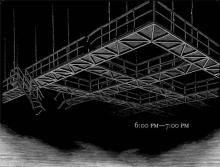 Eve of Destruction
Eve of Destruction Phantom File
Phantom File Ghost in the Machine
Ghost in the Machine The Land of Elyon #4: Stargazer
The Land of Elyon #4: Stargazer The Tenth City
The Tenth City The Dark Planet
The Dark Planet The Crossbones
The Crossbones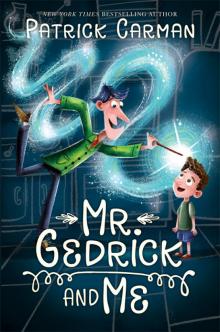 Mr. Gedrick and Me
Mr. Gedrick and Me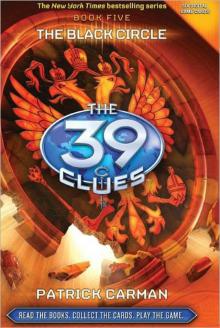 The Black Circle
The Black Circle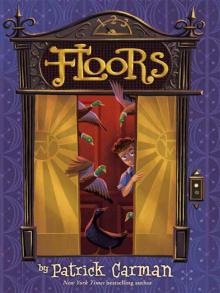 Floors
Floors Beyond the Valley of Thorns
Beyond the Valley of Thorns Quake
Quake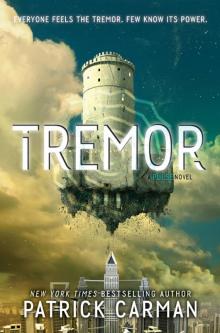 Tremor
Tremor Rivers of Fire
Rivers of Fire The House of Power
The House of Power Dark Eden
Dark Eden Into the Mist
Into the Mist Fizzopolis: The Trouble With Fuzzwonker Fizz
Fizzopolis: The Trouble With Fuzzwonker Fizz Pulse
Pulse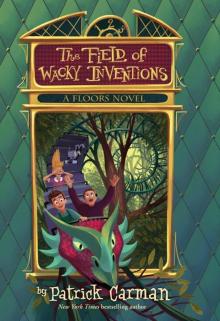 3 Below
3 Below The Dark Hills Divide
The Dark Hills Divide Skeleton Creek
Skeleton Creek The Raven
The Raven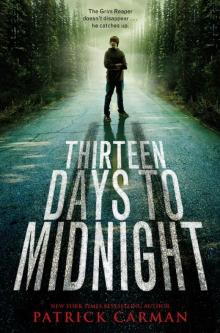 Thirteen Days to Midnight
Thirteen Days to Midnight Fizzopolis #2: Floozombies!
Fizzopolis #2: Floozombies! Rivers of Fire (Atherton, Book 2)
Rivers of Fire (Atherton, Book 2) Stargazer
Stargazer The Trouble with Fuzzwonker Fizz
The Trouble with Fuzzwonker Fizz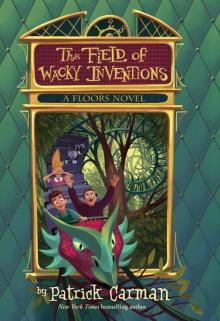 Floors #3: The Field of Wacky Inventions
Floors #3: The Field of Wacky Inventions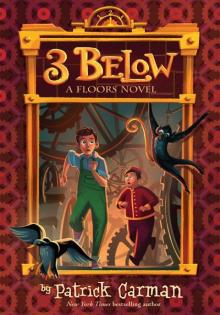 Floors #2: 3 Below
Floors #2: 3 Below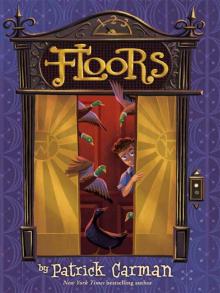 Floors: Book 1
Floors: Book 1 Crossbones
Crossbones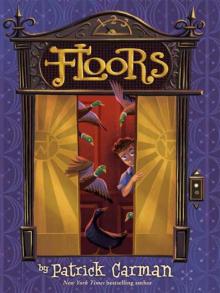 Floors:
Floors: Fizzopolis #2
Fizzopolis #2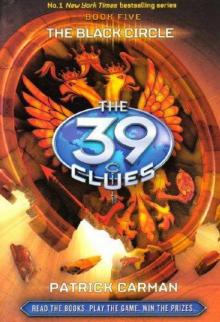 The Black Circle - 39 Clues 05
The Black Circle - 39 Clues 05 Into The Mist (Land of Elyon)
Into The Mist (Land of Elyon)